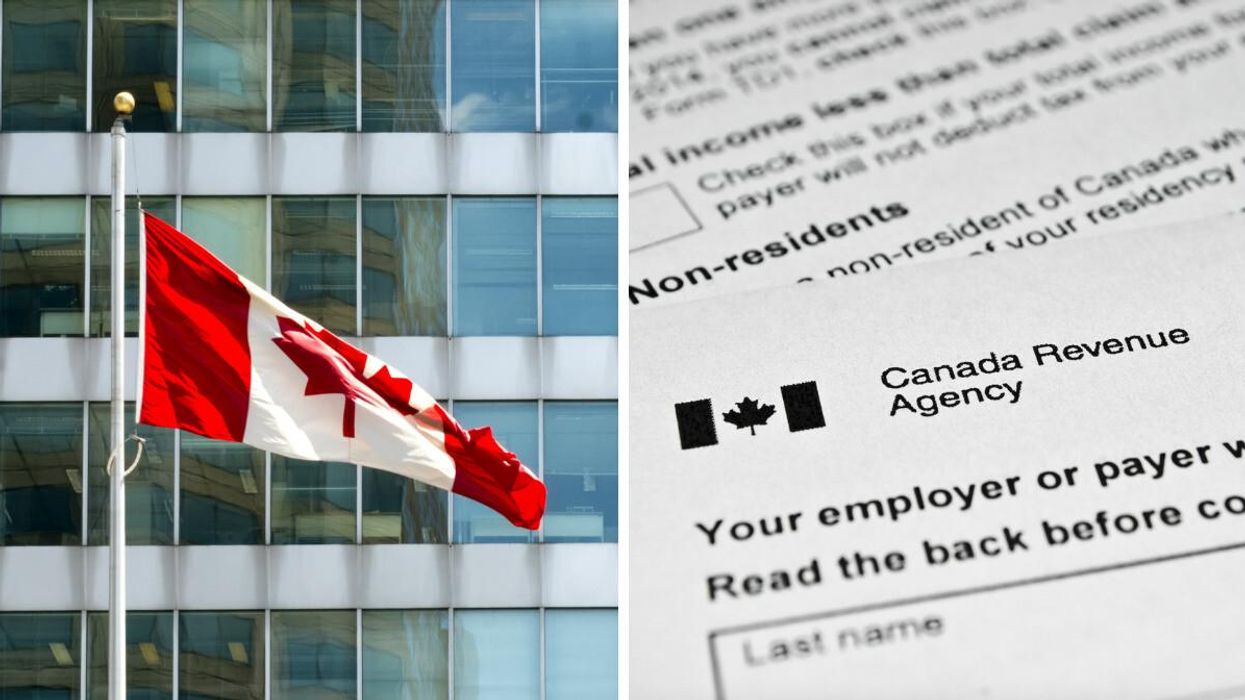9 Big Changes The CRA Wants You To Know About That Could Impact Your 2022 Taxes
Tax time is coming, folks!

A Canadian flag. Right: An income tax return form.
Get ready, taxpayers! Canada's tax filing deadline is fast approaching, and that means it's time to sit down and get to grips with some figures.
Before you get started though, the Canada Revenue Agency (CRA) has shared a number of tax changes to be aware of for 2022 — including new tax brackets, changes to the disability tax credit, increases to the first-time home buyers' tax credit and more.
Ahead of the May 1 tax deadline, here's a look at the changes you should be aware of before you complete and submit your 2022 returns:
How COVID-19 benefits impact your taxes
If you received COVID-19 benefits last year, it's important that this is reflected in your 2022 tax return as these payments are taxable.
This applies to federal, provincial or territorial government COVID-19 benefit payments, including the Canada Recovery Benefit (CRB), Canada Recovery Caregiving Benefit (CRCB), Canada Recovery Sickness Benefit (CRSB) and the Canada Worker Lockdown Benefit (CWLB).
If you claimed any of these benefits last year, you should have received a T4A slip featuring detailed instructions on how to report the payments on your tax return.
If you can't find the T4A slip, you can find it in the CRA's My Account portal.
In some cases, payments from the above benefits may be tax-exempt, including under section 87 of the Indian Act.
The air quality improvement tax credit
If you're self-employed or a member of a partnership, you may be eligible to claim this refundable tax credit on your 2022 return.
If you're eligible, the air quality improvement tax credit offers a refundable credit equal to 25% of your total ventilation expenses (up to $10,000 for a single location) if you've paid to improve the ventilation or air quality at work.
The tax credit — which is new this tax year — applies to expenditures made or incurred from September 1, 2021, to December 31, 2022.
Disability tax credit
Another relatively new change to be aware of at tax time this year is a change to the eligibility requirements for life-sustaining therapy under the disability tax credit (DTC).
For 2021 and later tax years, the CRA says individuals diagnosed with Type 1 diabetes meet the eligibility criteria.
This means some of the costs related to having Type 1 diabetes will now be offset via the DTC — reducing the amount of income tax an individual may have to pay.
First-time home buyers' tax credit
There's been a pretty significant change to the amount used to calculate the first-time home buyers' tax credit (HBTC), which is useful to know when filing your 2022 tax return.
For the 2022 tax year, the amount has doubled to $10,000, providing a tax credit of up to $1,500 to eligible home buyers.
Previously, eligible first-time home buyers were able to claim a non-refundable tax credit of up to $750 — as the value of the HBTC is calculated by multiplying $5,000 by the lowest personal income tax rate (15% in 2022).
Home accessibility tax credit
The annual expense limit of the home accessibility tax credit has doubled to $20,000, providing a tax credit of up to $3,000.
This non-refundable tax credit allows homeowners to claim renovation or alteration expenses if changes have been made to a property to make it safer or more functional for qualifying individuals with accessibility needs.
Before 2022, the annual expense limit of the HATC was $10,000, which would provide a tax credit of up to $1,500.
Work-from-home expenses
Following the COVID-19 pandemic, changes were made to how individuals can claim home office expenses at tax time.
The temporary flat-rate method now enables eligible employees to claim $2 for each day they worked from home, up to a maximum of $500.
If your expenses are more expensive or more complex, it's still possible to use the detailed method.
In 2022, eligible employees can claim deductions on their personal income tax return for certain home office expenses – like phone bills, supplies and furniture, for example.
Medical expense tax credit
The list of eligible medical expenses that can be claimed against your income was recently expanded to include fees related to fertility clinics or surrogacy.
The CRA confirmed that amounts paid to Canadian fertility clinics and donor banks, surrogate mothers, donors and more can now be considered claimable medical expenses.
2022 tax brackets
To account for inflation and other factors, the federal tax brackets for 2022 were raised according to an indexation of 2.4%:
- $0 to $50,197 of income — 15%
- More than $50,197 to $100,392 — 20.5%
- More than $100,392 to $155,625 — 26%
- More than $155,625 to $221,708 — 29%
- More than $221,708 — 33%
Canada's 2022 tax deadline
Something that may surprise Canadians this year is that Canada's tax deadline is not on April 30, as it is typically.
Instead, the 2022 tax deadline is May 1, 2023. As April 30 this year lands on a Sunday, your return will be considered filed on time if the CRA receives it or it is postmarked on or before the following Monday (May 1).
- 7 Tax Credits & Expenses You Can Claim In 2023 That Could Save You Money When Filing ›
- These Are Canada's Tax Brackets For 2022 & Here's What It Means For Your Taxes ›
- This Is The 2022 Tax Deadline In Canada & Exactly What You Need To Submit On Time ›
- The Ontario Opportunities Fund Could Be A Great Way To Save on Taxes & Here's How It Works - Narcity ›
- The CRA Told Me I Owed $31,000 In Tax Last Year & No, It Wasn't A Joke Or Scam (PHOTOS) - Narcity ›
- Here's How Canadians Can Avoid Getting Duped By Scammers Posing As The CRA This Tax Season - Narcity ›